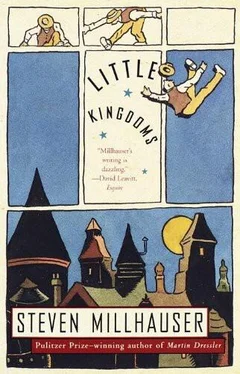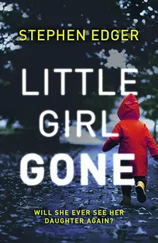As he sat by Stella in the evenings, turning the upper sheet back to form a smooth border over her blanket, or holding his palm against her slightly warm forehead, he felt, beneath his anxiety, an odd tenderness for her illness; and he was grateful to his daughter, for releasing him into a sweet, intoxicating realm of freedom.
A week later the fever vanished as mysteriously as it had come, and as Franklin worked long into the night, he wondered whether he had somehow drawn Stella’s fever into himself, where it flared up into images. The new animated cartoon or fever-vision was likely to be ten or even twelve minutes long, which meant ten thousand or twelve thousand separate drawings; and Franklin let himself sink into his night world with deep and secret joy.
The secrecy was crucial, he felt it in his bones: he must never let Kroll know what he was doing, never speak of it even to Max, who would suggest shortcuts, give well-meant advice, surround him with an air of reproach and expectation that would only get in his way. Cora, who knew he was back at work in his study, chose not to speak of it — and Franklin was glad, for he knew that his work irritated and exasperated her, as if it were a form of secret disobedience. Only to Stella did he sometimes speak of the growing piles of rice paper, the slow and loving work of retracing each drawing and inking over the pencil lines, and one evening when Cora had a headache and retired to her room after dinner, he took Stella up to the tower study and showed her his pile of inked drawings and his handmade viewing machine. Stella turned the crank carefully and made the pictures move: a doll with large, wondering eyes was walking through a moonlit department store. Stella watched to the end of the sequence, which broke off abruptly as the doll discovered the top step of an escalator. Then Franklin started at the beginning, with all the dolls waking in the toy department — the fluttering dance of the paper dolls had cost him a week of nights and lasted ten seconds. Stella watched all the way to the top of the escalator and started from the beginning again. Franklin sat down at his desk, and when he raised his head he was startled to find Stella fast asleep on the floor. It was past midnight. He carried her down in his arms and went back up to work.
The cartoon had presented itself to him in part as a series of formal problems to be solved. In Dime Museum Days he had introduced his girl into a strange world of scrupulously drawn settings and realistic freaks, both of which gradually assumed the distortion of nightmare. The girl herself had remained a frightened visitor from the sane, outside world. In Toys at Midnight the protagonist was a doll who magically came to life and would herself undergo a series of physical transformations that called for continually changing perspectives. Franklin felt the desire to accept a certain challenge posed by the artificial world of animated drawings: the desire to release himself into the free, the fantastic, the deliberately impossible. But this desire stimulated in him an equal and opposite impulse toward the mundane and plausible, toward precise illusionistic effects. As the violations of the real became more marked, the perspective backgrounds became fuller and more detailed; and as he gave way to impulses of wild, sweet freedom, he found himself paying close attention to the look of things in the actual world: the exact unfolding of metal steps at the top of a down escalator, the precise pattern of reflections in the panes of a revolving door seen from inside. One morning before entering the World Citizen he went down the steps of a nearby subway entrance and squatted beside a turnstile with sketchpad in hand, recording the turnstile arms viewed from below, while busy people looked at him with amusement or indignation. And one dark afternoon during a sudden storm he left his office and stood under a grocer’s awning, recording the distorted reflections of stoplights and store lights in the wet black avenue, the halos of rain-haze about the street lamps, the wavelike sweeps of rain blowing across the street like the bottom of a blown curtain.
The doll went round and round in the revolving door and was flung out onto the sidewalk: he had the complex sequence of motions exactly right. For some reason the simple descent into the subway was more difficult, and the nightmare subway ride, with carefully exaggerated perspectives of looming seats and menacing faces, was causing him a lot of trouble — and as Franklin felt himself falling deeper and deeper under the spell of his cartoon, as he patiently traced backgrounds over and over again on the thin, crackly rice paper, throwing away entire sequences and studying the results in his viewing machine, he had the sense that he was living in the rain-haze of his shadow world, through which objects showed themselves waveringly, with an occasional hard edge peeping through. Somewhere beyond the rain-haze he and Stella and Max and Cora were walking in checkered sunlight on a green, wooded path, but when he arrived home he had to drag his feet through piles of red and yellow leaves; the wind howled as he climbed the stairs to his study; from the high windows he could see the ice skaters on the river, turning round and round, faster and faster, until they were a whirling blur — and emerging from their spin they sat back lazily in sun-flooded rowboats, their straw hats casting blue shadows over their eyes.
“The Coca-Cola bottle,” Max was saying as he pulled the oars, “is instantly recognized by a wheat farmer in Iowa, an adman in Manhattan, and a housewife in Wyoming. It’s the most powerful image of a civilization since the pyramid. And what is its secret? I’ll tell you its secret.” Stella sat with one arm over the side of the rowboat, letting her fingertips drag through the water. Cora, leaning back on a cushion with her straw hat pulled low, brushed at a fly on her shoulder.
“What, Max?” Cora said. “What’s its secret?”
“The Coca-Cola bottle is shaped like a woman. That’s its secret.”
“Oh, Max,” Cora said, “I can’t believe that. Do you really think I look like a Coca-Cola bottle?”
“In a general way, yes. I mean it strictly as a compliment, of course.”
“Did you hear that, Franklin? Max says I look like a Coca-Cola bottle.”
“I read the other day,” Franklin said, “that a woman found a mouse in her bottle of Coca-Cola.”
“Really, Franklin,” Cora said. “How disgusting.”
“When she complained to the company, they apologized and sent her a free case of bottles. You see? It had a happy ending.”
“That’s what I mean about them,” Max said. “They always satisfy the customer.”
“What about the mouse?” Franklin said.
“I don’t think anyone,” Cora said, “has ever compared me to a Coca-Cola bottle. Y’all say the sweetest l’l ol’ things.”
“The mouse,” Stella said, “turned into a giant rat. Then she ate the lady up.”
“Stella,” Cora said, “please don’t interrupt when we’re trying to talk.”
Under overhanging branches Max brought them to shore. He pulled the boat onto a strip of sandy earth and held out his forearm for Cora, who seized it with one hand while holding onto her hat with the other. Franklin lifted Stella out and followed Max and Cora through the trees. “All this stays the way it is,” Max was saying. “The road will be in back of the property. Watch your step. Up there — on the other side of the stream — that’s where things will begin to look different.” On the other side of the stream they passed through more woods and came to a clearing. Sawed-off branches lay about, and here and there stood a few smooth stumps. On one of the stumps someone had left a tin mug. “You see how private it is,” Max said solemnly, narrowing his eyes as he stared down through the trees at the river.
Читать дальше












